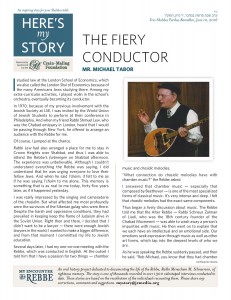The Fiery Conductor
I studied law at the London School of Economics, which we also called the London Shul of Economics because of the many Americans Jews studying there. Among my extra-curricular activities, I played violin in the school’s orchestra, eventually becoming its conductor.
In 1970, because of my previous involvement with the Jewish Society at LSE, I was invited by the World Union of Jewish Students to perform at their conference in Philadelphia. And when my friend Rabbi Shmuel Lew, who was the Chabad emissary in London, heard that I would be passing through New York, he offered to arrange an audience with the Rebbe for me.
Of course, I jumped at the chance.
Rabbi Lew had also arranged a place for me to stay in Crown Heights over Shabbat, and thus I was able to attend the Rebbe’s farbrengen on Shabbat afternoon. The experience was unbelievable. Although I couldn’t understand everything the Rebbe was saying, I did understand that he was urging everyone to love their fellow Jews. And when he said l’chaim, it felt to me as if he was saying l’chaim to me alone. This memory is something that is as real to me today, forty-five years later, as if it happened yesterday.
I was really impressed by the singing and camaraderie of the chasidim. But what affected me most profoundly were the survivors of the Siberian gulag who were there. Despite the harsh and oppressive conditions, they had prevailed in keeping keep the flame of Judaism alive in the Soviet Union. Right then and there, I decided that I didn’t want to be a lawyer – there were enough Jewish lawyers in the world; I wanted to make a bigger difference, and from that moment I committed my life to Jewish education.
Several days later, I had my one-on-one meeting with the Rebbe, which was conducted in English. At the outset I told him that I have a passion for two things – chamber music and chasidic melodies.
“What connection do chasidic melodies have with chamber music?” the Rebbe asked.
I answered that chamber music – especially that composed by Beethoven – is one of the most specialized forms of classical music. It’s very intense and deep. I felt that chasidic melodies had the exact same components.
Thus began a lively discussion about music. The Rebbe told me that the Alter Rebbe – Rabbi Schneur Zalman of Liadi, who was the 18th century founder of the Chabad Movement – was able to wash away a person’s impurities with music. He then went on to explain that we each have an intellectual and an emotional side. Our emotions seek expression through music as well as other art forms, which tap into the deepest levels of who we are.
As he was speaking the Rebbe suddenly paused, and then he said, “Reb Michael, you know that they had chamber music playing in Auschwitz as they sent Jews off to the gas chambers.”
He continued, “So you see that, when divorced from morality, the arts can be used for anything. In the hierarchy of values, the arts have a place, but only as long as Torah is at the apex, and the central theme.”
Right then and there I felt that I could have left and the whole trip would have been worthwhile, just to hear that idea. But I also had some other issues that I wanted to discuss.
I mentioned that I was the leader of the orchestra at London School of Economics. Whenever we played, I would wear my yarmulke, but I still felt a bit guilty. I had previously studied in yeshivah, and I felt that I should have been spending my free time learning Torah instead of playing in an orchestra.
The Rebbe answered, “If you feel that music is important to you, then focus on that. There’s nothing wrong with it. You have a gift – so put it to good use. But while you’re in the orchestra, do more than just play. I want you to go out of your way to influence the non-Jews there to observe the Seven Noahide Laws.”
I could have fallen right through the floor. Here was a chasidic Rebbe in New York worrying about the spiritual lives of non-Jews playing in a school orchestra in London. So much so, that he was directing me to go out of my way to influence them by explaining the Seven Laws of Noah – which demand of the entire human race to eschew idolatry, blasphemy, murder, adultery, theft and animal cruelty, and which require the establishment of universal courts of justice.
Then I raised my final issue that I had wanted to discuss. “I have a fiery personality,” I confessed. “I have this antinomian streak within me, which means, I don’t like to be told what to do.”
Based on my previous education and yeshivah experience, I was expecting a lecture from him. I was expecting to be told that I must work hard to crush this aspect of my personality. But he said nothing like that. He just looked at me with a twinkle in his eye and said, “Michael, don’t we all? But it’s only our bad inclination.”
In other words, no big deal. But, like every aspect of the bad inclination, it’s something we must constantly fight to rein in.
His approach was so positive. He responded to every issue I raised with such understanding. And what he said completely revolutionized the way I approached life. I realized that, from this day forward, I would have fresh way of looking at things.
When I left that meeting, I said to myself that I don’t need to come back again, because I now have enough to work on for three lifetimes.
Mr. Michael Tabor, an educator, musician and well-known story-teller, was interviewed in his home in Manchester, England in May of 2015.
This week’s Here’s My Story is generously sponsored:





